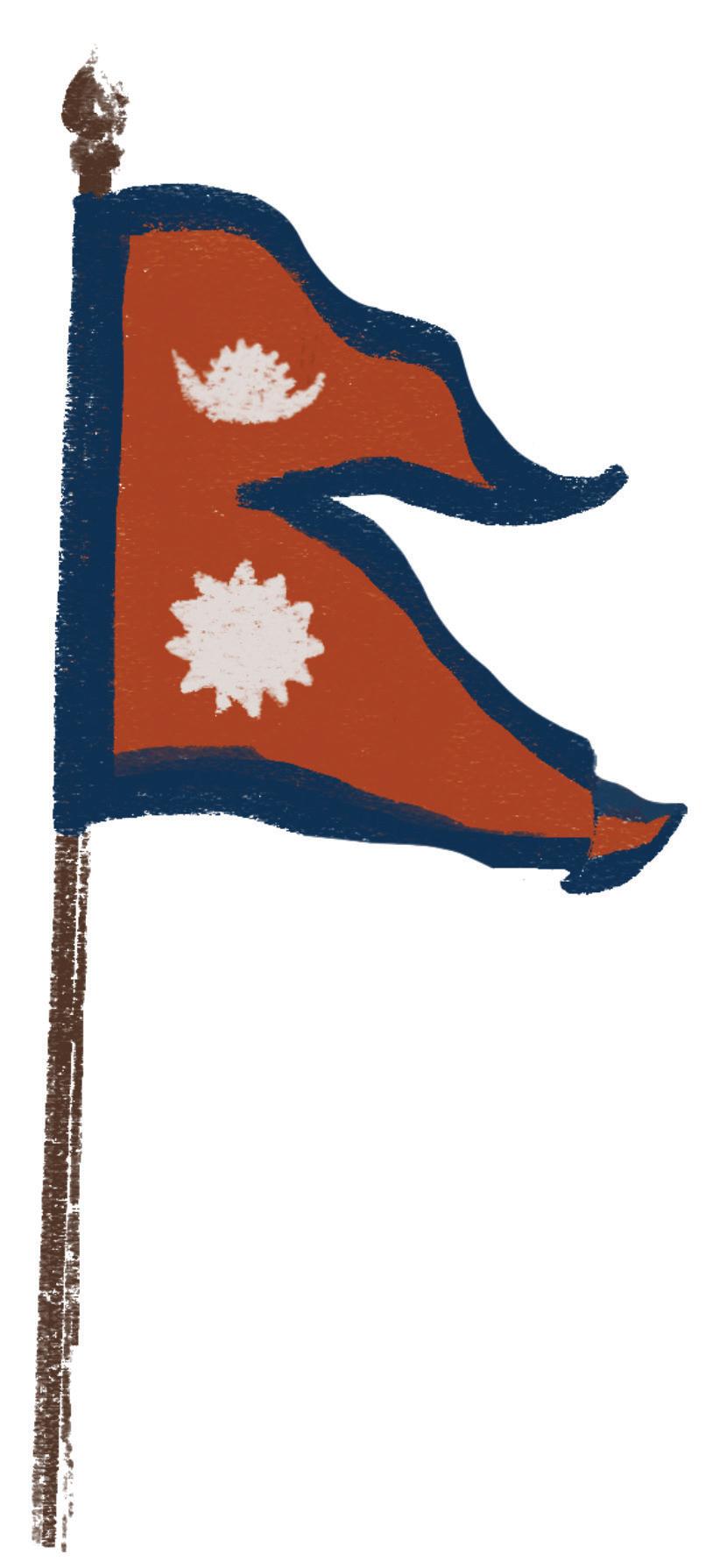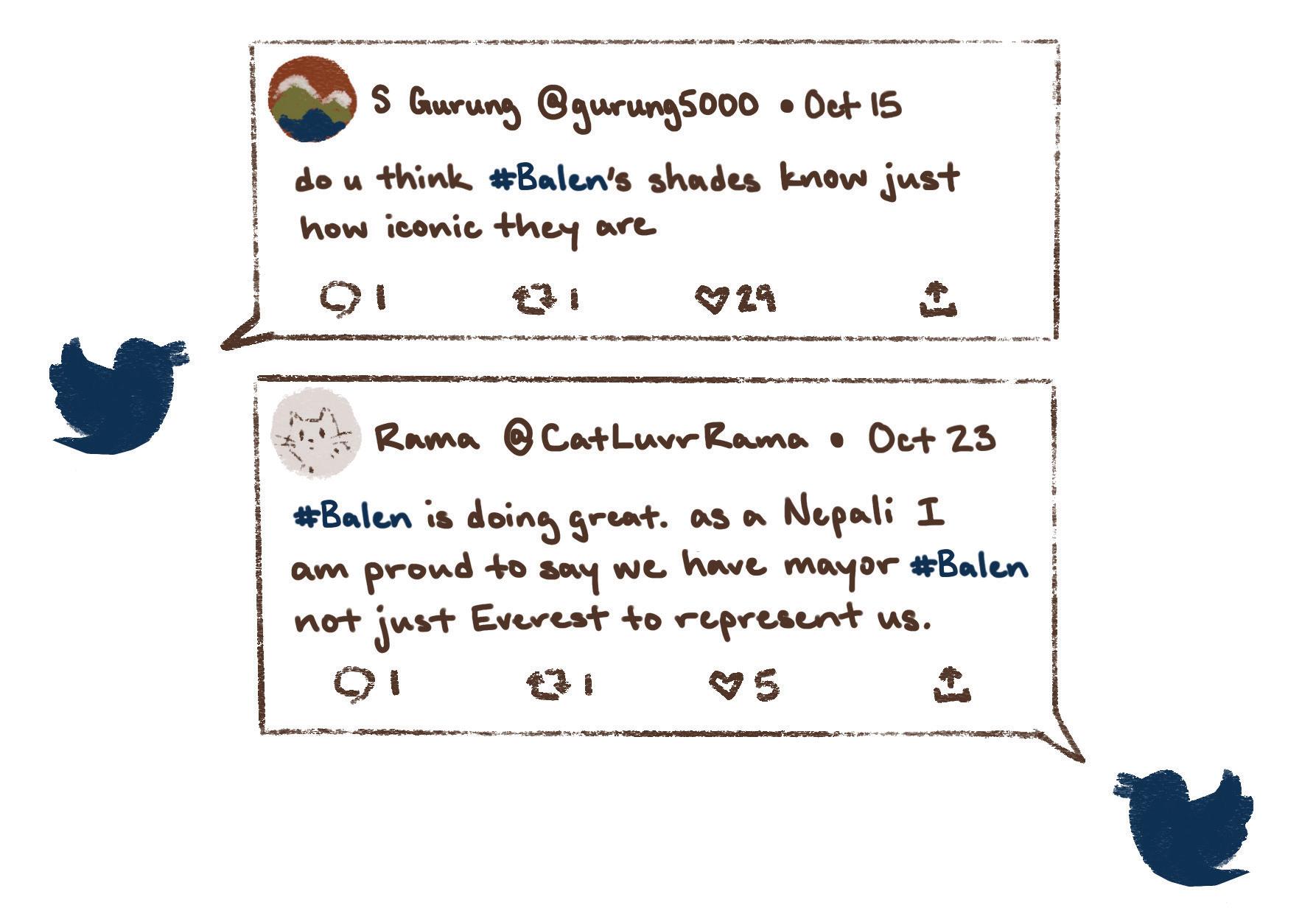
14 minute read
THE ‘UNDERDOG’ MAYOR OF KATHMANDU

The 'Underdog' Mayor of Kathmandu
Advertisement
A reflection on privilege and politics in Nepal
When I visited Nepal as a kid, I didn’t think my family there was particularly privileged. Sure, we had an actual house rather than the ramshackle aluminum huts you encounter in the alleyways of the city, but the showers were always cold and water had to be delivered by a bottled water company rather than drunk straight out of the tap, so I assumed we were somewhere in the middle.
As I grew older, I realized how incredibly privileged my family is. In addition to being well-off compared to the general population, we are Brahmins, which is the highest caste according to the Hindu caste system. Even though the caste system has been legally abolished in Nepal for decades now, caste-based discrimination and violence are still grim realities. Dalits, a term reclaimed by communities relegated to the lowest strata within the caste system, face higher poverty rates as compared to other caste groups. They currently make up only around eight-percent of the Nepali parliament.
Some members of my family struggle to reckon with their privilege. They don’t understand why Nepal needs affirmative action for Dalit people, saying things along the lines of: “So you’re telling me a hardworking Brahmin boy will now be rejected from jobs just because he’s Brahmin?” What I hear in the living rooms of some of my relatives in Nepal feels eerily similar to the discourse surrounding college admissions in the United States.
This summer, I returned to Nepal. Kathmandu’s mayoral elections had just happened, and I heard that an ‘underdog’ rapper-turned-politician named Balen had won. What I learned is that the election of Balen was not just an isolated event, but a reflection of the larger sociopolitical patterns of Nepal as well as a commentary on my family’s privilege.
+++
Being a biracial kid growing up in the United States is almost oxymoronic. The second the plane wheels hit the tarmac of the Kathmandu airport and my family greets me with Namastes and hugs, I feel like I’m home. Yet, at the same time, I struggle to comprehend the spoken language and am illiterate in Nepali. I know so little about Nepali politics and history, which in itself is a confession of the privilege of my family. Not knowing about Nepali politics means you don’t know anybody personally affected by the violence of the recent Maoist uprisings, means your family doesn’t belong to a systemically persecuted ethnic group, means that your family hasn’t been affected by caste discrimination.
This summer, I decided I was going to change things. Here’s what I learned: the area that is now Nepal was once a plethora of small kingdoms governed by local kings until Prithvi Narayan Shah, from the Gorkhali kingdom, decided to conquer the neighboring kingdoms in the mid-1700s. Then, for a while, Nepal was even bigger than it is today, ruled over by the Gorkhas, until the British-Nepali war, which reduced Nepal’s borders to what they are today. (Most Nepalis today will begrudgingly call the war a ‘stalemate,’ a nationalistic rhetoric created to portray ourselves as better than other South Asian countries, even though Nepal lost 176,000 acres of land.) Nepal was then ruled by a monarchy and didn’t officially become a democracy until 2008. There were attempts at a monarchy-controlled Congress in the years leading up to the last king of Nepal walking away from the throne in 2008 due to popular pressure. The current Nepali constitution wasn’t approved until 2015, largely due to disagreements between the political parties.
Obviously, this summary of Nepal’s history lacks any sort of nuance, but seeing as the only things the average person knows about Nepal are that it’s the home of Mount Everest and that the crown prince massacred basically his whole family in 2001, I felt it necessary to provide the world’s shortest and overly simplified crash course in Nepali history.
There is a tendency to assume the politics of all countries of the Global South are not progressive, but Nepal, like all countries, is complex. It is progressive on abortion rights (women can seek abortion for any reason for up to 12 weeks) and the government legally recognizes nonbinary people. Obviously, there still exist social struggles and difficulties in implementing these laws, but the legislation is progressive nonetheless.
While perusing the Kathmandu Post in my desperate attempt to get up to date on Nepali politics, I discovered that there had recently been a mayoral election, and a rapper named Balen had won.
Then, as I walked through the humid streets of Kathmandu with my family on the way to a relative’s house, my uncle announced that he voted for Balen in the recent Kathmandu mayoral election. With that proclamation, my uncle went from someone who I viewed as the very epitome of Nepali stoicism (“ke garne” – what can you do?) to the living embodiment of lunacy. How could my uncle, an intelligent man, vote for a rapper with no political experience?
At least my uncle voted. My two cousins aren’t registered to vote, displaying an indifference to politics I see as yet another example of our family’s privilege. Yes, Nepali government offices are dysfunctional, but that’s no excuse for complacency. Especially seeing as virtual voter registration is now an option in Nepal, their flimsy excuses for not voting become even weaker.
But, even my family can’t be confined to a single story of complacency—for example, one of my uncles was involved in the democracy movement of the mid-to-late-1900s. As I read more about Nepali history that summer and learned about the blood, sweat, and tears that people like my uncle put into Nepal’s fight for democracy, the apathy of certain family members infuriated me.
Similarly, Balen, the now-mayor of Kathmandu, proclaimed on social media in 2016, “I did not vote today. I was not a candidate. I graduated in Civil Engineering, I am halfway through my Masters in Structural Engineering. I want to build a country. I will vote next time, and vote for myself. I develop my country. I don’t depend on anyone else.” This quote reminds me of the younger members of my family, who justify their political apathy by citing the bad track records of politicians and a lack of faith in any of the presented candidates, but refuse to acknowledge that political apathy is still complacency.
+++
But who is Balen, anyway? As I found out, Balen, or as his young supporters call him, ‘Balen Dai’ (‘dai’ meaning ‘older brother’) is a 32-year-old civil engineer and rapper. He is known for his relief efforts following the 2015 Nepal earthquake and his involvement in the “We for Constitution” movement. This group aimed to put pressure on the government to resolve the pre-2015 governmental gridlock and pass a constitution, according to his campaign website. Ultimately though, it was his charisma and fame as a rapper that cemented Balen’s public image, with the song “Balidan” (meaning “sacrifice”) skyrocketing to over 6 million views prior to the election.
What I was initially told about Balen mirrored much of the misleading political information I’ve accepted as truth from my family throughout the years. I accepted that Nepal was ‘united’ by the Gorkha warriors’ conquest, which erased the inherent violence that comes with conquest and also the marginalization of the Newar people of Kathmandu Valley. Similarly, my family members would tell me that Nepal “never got around to” writing a constitution before 2015, as if politicians simply forgot to draft the important document. (Yes, I believed this, really.) I accepted these political falsehoods as truth because I assumed my family who actually lived there knew better than I did. Had I been younger, maybe I would have accepted the way my family spoke about Balen—a young go-getter not involved with the corrupt, established parties who would bring much-needed change to Kathmandu—as objective truth. In fact, the people who responded most positively to his campaign were those who agreed with this narrative, due to their frustration with elite politics.
But what are the changes that Kathmandu so desperately needs? According to my family, the biggest problems are motorbikes crowding the streets and trash everywhere—another reflection of the privilege we hold in Kathmandu, if those are what we’ve identified as the largest issues facing our city. According to “The Social Construction of Balen Shah,” an article written by journalist Pragyan Thapa Ghimire for independent Nepali newspaper The Record, growing economic inequality, inflation, unemployment, air pollution, and lack of infrastructure are considered to be the biggest issues facing the city. At the Kathmandu mayoral debates, issues discussed included how to deal with monsoon flooding, implement better water supply, and organize our public transportation systems.
Additionally, the voting demographics of Kathmandu are complicated, as there’s been a recent surge in voter registration and many people who live in Kathmandu don’t vote there. With the 1996–2006 Maoist war’s violence in the more remote parts of Nepal, more educational and work opportunities arising in the big city, and small villages being destroyed by the 2015 earthquake, the number of migrants to Kathmandu has been steadily increasing. As of March 31 of this year, half the people registered to vote in the May 13 local elections (which included the mayoral race) were from outside of Kathmandu.
+++
Despite Kathmandu’s huge population, the city’s voter turnout is low in comparison to the rest of the country, ranking third nationwide. Increasing lack of faith in the government continues to be a persistent issue throughout Nepal, as voter turnout for elections across the country fell by 10% this year. Corruption scandals combined with a lack of fulfillment of campaign promises has led to lower political participation overall, but particularly amongst Nepali youth. However, this is not to say that political activism among young Nepalis is dead—for instance, young people organized protests and sit-ins over the government’s lack of response to the COVID-19 crisis.
Balen’s status as an independent candidate set him apart from all that in the eyes of the public. The current two most influential political parties in Nepal are the Nepali Congress and the Communist Party of Nepal (Unified Marxist–Leninist), but there are currently seven political parties recognized in the national parliament. Running as part of a party gives you access to funding and lobbying, but oftentimes, candidates find themselves indebted to the interests of the party that helped them win.
By running as an independent, Balen emphasized that he wouldn’t be tied to a party and could instead speak for the constituents, playing on a long history of disillusionment with the political parties of Nepal. Balen also promised transparency, but with his dedication to transparency comes his stance in favor of a dramatic increase in state surveillance. He stated in his election manifesto that there will be “mandatory CCTV connection in all public transport for security.”
Another important part of his campaign was his history in civil engineering, seeing as Kathmandu is riddled with infrastructure problems. Examples include his claim that 70% of the Kathmandu city budget is written using infrastructure and civil engineering terms and that being a civil engineer has given him a knowledge of “everything.” However, there are important social nuances behind the building of infrastructure, especially in a city as diverse as Kathmandu. Balen’s technical expertise isn’t as all-encompassing as he makes it out to be.

+++
Balen also took advantage of existing hierarchies by mobilizing the high social status that careers like engineering and medicine carry in Nepal. (Only last summer did I tell my relatives that I’ll probably be an English major.) Balen frequently cited the money he’s made from his engineering projects as proof of his integrity. Balen claimed that due to the money he’s already made, there’s no financial gain he could get from being mayor.
Balen also made a special effort to appeal to Newa voters, an ethnic group of the Kathmandu Valley, and promised to incorporate Newa language, history, and culture into the curricula of Kathmandu schools. However, when asked in an interview about his own ethnic identity, he claimed that any sort of participation in Newa culture makes you Newar and that before the Shah kings conquered the Kathamandu Valley, everyone in that region was Newa. This completely contradicts the situation in Nepal today, as Newa are a defined ethnic and linguistic group. The rhetoric of Balen’s campaign was almost post-ethnic, as he frequently refused to comment on his ethnicity, remarking that such questions were not important and “casteist.” It is notable that he also doesn’t use his full name in his campaign promotion, just going by ‘Balen’ rather than ‘Balen Shah’ because your last name identifies you with your caste in Nepal.
Balen’s fame as a rapper cannot be underestimated—his well-known status of celebrity among the youths of Nepal saved him time that other grassroots politicians would need for advertising themselves to the public. Through social media and a targeted PR campaign, he constructed a new persona: the no-nonsense man behind the dark sunglasses.
Balen won the Kathmandu mayoral election on May 13, 2022 with 38.6% of the vote. After the victory was announced, the streets were filled with supporters celebrating the triumph of their ‘underdog’ candidate. (And can Balen— someone coming into this election with money and name-recognition—really be as much of an ‘underdog’ as his supporters make him out to be?)
Balen’s victory must be seen as a trend—independent candidates triumphed over party candidates in the recent May 13 elections, not just in the Kathmandu mayoral race. Balen’s election fundamentally disproved the idea that parties are invincible—his two major opponents were both from prominent, established parties with political careers behind them. Some see this as the start of a vibrant new progressive era, in which independent candidates could overtake party politicians. More broadly, Balen’s election is a reflection of the larger problems facing Nepal, from distrust in the political parties due to scandal and corruption to a desire for a ‘post-ethnic’ society that doesn’t ‘see’ caste or ethnicity.
+++
Balen was sworn in a little less than five months ago on May 30, 2022. In the list he’s published of his accomplishments in his first 100 days in office, he emphasized the removal of unauthorized vendors from footpaths, livestreamed city council meetings to increase transparency, and demolished illegal structures. This move generated controversy, as owners of the buildings said they didn’t receive proper notice of the demolitions, and the due processes for building demolition weren’t properly followed. Many also criticized Balen as tacky for taking a camera crew to film these demolitions.
The case of Balen is an example of the tendency to idealize people and simplify events in order to serve certain narratives. It’s much easier to proudly buy into the nationalist narrative that Prithvi Narayan Shah unified the nation, rather than admit that there was a lot of violence involved in the so-called “unification” of Nepal. Similarly, it’s easier to characterize Balen as this anti-establishment figure who will revolutionize Kathmandu rather than a carefully crafted public persona who played on appealing rhetorics in order to win the mayoral election. He’s a politician, a truth many seem reluctant to accept. We must be careful, as this tendency to oversimplify leads to false, harmful narratives that end up perpetuating existing systems of power and nationalism that marginalize disadvantaged groups.
After the mayoral elections, some of my relatives proudly told me they voted for Balen, confessing it to me as if it were a bold, radical act. And the idea of an independent candidate beating someone from an established political party is pretty ground-breaking in Nepal, hence the feeling of clandestine excitement I would pick up on whenever an uncle or cousin told me they voted for Balen. However, there is nothing radical about privileged people voting for a candidate whose dream seems to be a colorblind, ‘post-ethnic’ society. What would be radical would be recognizing our privilege and figuring out how we can be allies to marginalized groups in Nepal.
INDIGO MUDBHARY B‘26 is nervous to send this article to her relatives.






